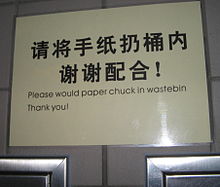Grim


Engrish is the slightly humorous term for incorrect English, especially used by Asians . The term Engrish often refers to syntactically and / or orthographically incorrect English-language keywords or sentences. Not infrequently, especially in Japan, English-language sentences (and increasingly the even more exotic -looking Greek letters ) such as B. used in advertising and popular culture as a design element and often misunderstood and incorrectly written down. The occurrence of onomatopoeic errors is favored by the different writing systems used in the Latin alphabet . Another example is Hong Kong black copies of Japanese cartoons ( animes ), which have often received very poor subtitles that are only remotely reminiscent of English because someone with good Japanese but poor English skills has translated hastily. A challenge that in turn contributes to the stimulus ( trash factor).
The word Engrisch itself alludes to the fact that people from East Asia often confuse the letters R and L , which are phonetically very close to each other, when dealing with the English language, both spoken and written : in a number of East Asian languages such as Japanese , Korean , some Chinese and regionally Thai , the letters R and L do not exist as such. In each of these languages there is only one sound from this phoneme space (however, this sound is not necessarily the same in the languages concerned). Because speakers of such languages normally have no contact with the phonemes R and L, it is usually not necessary for them and therefore, due to a lack of practice, also not possible to hear them apart or to pronounce the relevant sound of Western languages correctly.
Malformations
Given the fact that phonemes are the same, English words are often written incorrectly, with a mix-up of R and L being the most common, but by no means the only sound error. Other examples are conceptual in nature, such as words that are one-to-one translations in one meaning, but lead to blatant and comical shifts in meaning in the chosen context.
In addition to the choice of words, there are numerous examples in which the grammatical concepts of the English language are incorrectly applied. Most Asian languages have no articles for definite / indefinite formation (a word, the word, (-) words), sometimes the plural formation is also forgotten, and the conjugation and sentence order of verbs (past tense, progressive form, indirect speech) is partly the same transferred in a distorting way.
A well-known example of an engraved sentence is “ All your base are belong to us ” . English-speaking Asian tourists and expats like to exchange detailed words and snippets of sentences , sometimes deliberately used for fun. A reference to the errors in question to the " Engrish speaking" Asians, however, almost always leads to an immediate correction.
Similar to Denglish ( German + English ) and Konglish ( Korean + English ), it is not a trained pidgin language . The use of engrisher words and sentence formations remains limited to isolated occasions and varies greatly from speaker to speaker, even if some fragments of sentences have found widespread local use as catchwords (compare pseudo- Anglicisms such as mobile phone in German or the synonymous "handeupon" in Korean) .
See also
- Wasei-Eigo , pseudo -Anglicisms in Japanese
